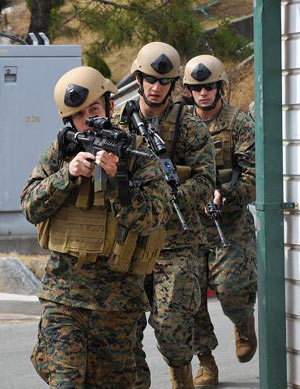The U.S. and South Korean military launched a massive joint military exercise on Monday amid Pyongyang's strong opposition and repeated warnings, further heightening the tensions on the Korean Peninsula.
 |
|
Members of the U.S. Marine Corps Fleet Antiterrorism Security Team Pacific (FASTPAC) take part in a U.S. naval base defence drill in Jinhae, about 410 km (250 miles) southeast of Seoul, March 9, 2009. [Xinhuanet.com] |
Military drills conducted amid DPRK's protest
According to Chosun Daily, about 26,000 U.S. troops and over 50, 000 South Korean troops will participate in the Key Resolve and Foal Eagle exercise all over South Korea from March 9-20. The USS John C. Stennis nuclear-powered aircraft carrier and a total of seven U. S. Aegis destroyers will take part in the exercises.
Ahead of the exercises, the Democratic People's Republic of Korea (DPRK) has repeatedly demanded the U.S. and South Korean military to cancel the exercises, saying the massive military drills impose grave threat on DPRK and "serve as a prelude to an invasion against the DPRK".
The U.S.-led United Nations Command and the DPRK military held general-level military talks last Monday and Friday respectively, to discuss measures easing the tensions on the Korean Peninsula. However, the negotiations failed to make significant progress as the DPRK urged to cancel the Key Resolve and Foal Eagle exercises while the UNC side insisted to conduct the "defensive-oriented" annual drills.
DPRK warning of war
In protest of the military exercises, the DPRK on Monday announced to cut off last military communications channel with South Korea and ordered its troops to be ready for a war against the U.S. and South Korea, several hours before the U.S. and South Korea kicked off their military exercises, with a warning of " merciless retaliatory blows" on the U.S. and South Korean troops in case of any invasion to DPRK.
The DPRK's army also warned that it will stage a war on the territories of the United States, Japan and South Korea if its satellite launch "for peaceful purpose" was intercepted.
Following the DPRK's decision of cutting off inter-Korean military communication channels and military warnings, the U.S. Forces Korea released a statement on the day to explain the ongoing exercises "are purely defensive in nature and have no connection to ongoing or current events."
South Korean Unification Ministry Spokesman Kim Ho-nyoun expressed regret over DPRK's latest measures and asked Pyongyang to take back its decision of cut off military communication channels. He also pledged to the South Korean people that the government will make efforts to ensure over 600 South Koreans to safely return from DPRK's inter-Korean industrial complex and tourist complex as soon as possible.
Meanwhile, South Korean Presidential Spokesman Lee Dong-kwan said the door towards inter-Korean dialogue "always remains open" to DPRK, asking Pyongyang to stop further provocations.
US envoy proposes resumption of six-party talks
Local analysts said DPRK's latest warnings and measures are aimed at pressuring South Korea's Lee Myung-bak administration to change its hard-line policy toward Pyongyang, while pushing the Obama administration into bilateral talks.
Stephen Bosworth, U.S. special envoy on the DPRK, arrived here last Saturday to mediate the six-party talks on the nuclear issues on the Korean Peninsula. Upon his arrival in South Korea, he said the United States and the DPRK "are reaching out," adding the Washington wants dialogue with Pyongyang, which was regarded as a positive signal for the improvement of U.S.-DPRK ties.
Bosworth, who had already visited China and Japan before traveling to Seoul, said on Monday that U.S. wants an early resumption of the six-party talks.
"We are hopeful that we can see the resumption of the six-party process in the relatively near future," the U.S. diplomat said after meeting with South Korean officials, including South Korean President Lee Myung-bak Prime Minister Han Seung-soo, Foreign Minister Yu Myung-hwan and South Korea's top nuclear negotiator Wi Sung-lak in Seoul, respectively.
As to the bilateral contact between the U.S. and the DPRK, Bosworth dismissed worries that Obama's administration may put a higher priority on direct talks with Pyongyang than the six-party talks that also involve China, Russia, South Korea and Japan.
"We continue to regard the six-party process as the central element of our effort to continue with the denuclearization of the Korean Peninsula," he said.
Although the heightening tensions on the peninsula might be developed into military confrontation or even bloody skirmishes, local analysts believed that, if the U.S. and the DPRK can sit at negotiation table and make progress in nuclear issues and bilateral affairs, the restrained inter-Korean ties and mounting tensions on the peninsula are hopeful to take a favorable turn.
(Xinhua News Agency March 10, 2009)